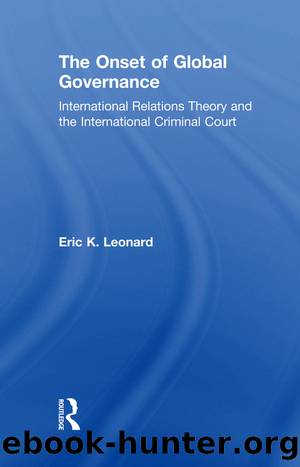The Onset of Global Governance: International Relations Theory and the International Criminal Court by Eric K. Leonard

Author:Eric K. Leonard [Leonard, Eric K.]
Language: eng
Format: epub
Tags: International Relations, Political Science, General
ISBN: 9780754645313
Google: gw6cAAAAMAAJ
Goodreads: 2814515
Publisher: Ashgate
Published: 2005-01-15T11:47:21+00:00
Weak Cognitivism
Weak cognitivism, as Adler and Haas put it:
Begin[s] where neoliberal institutional approaches leave off; namely we relate institutions to the dynamic interaction between domestic and international political games, and we describe these games not only in terms of material interests but also as part of the bargaining and negotiation that take place among different epistemic understandings and practices âcarriedâ by epistemic communities and later by policymakers as well.56
In many ways this approach is a supplement to neoliberalism, but the primary difference resides in the emphasis that they place on ideas. According to weak cognitivists, it is ideas (often ascertained from epistemic communities) that shape actorsâ interests. Interests are not exogenously given; therefore, there is a need to move beyond Keohaneâs contractualist model.
In order to understand the weak cognitivism position, one must look at the three core assumptions of this approach.57 First, the weak cognitivist approach centers on the role of interpretation. According to this perspective, prior to the formation of an international regime, actors must assess the situation and determine what they consider the proper action. This assessment is an interpretive endeavor that is not necessarily predicated on some objective form of exogenously given interests. This interpretation is an intersubjective exercise that depends on the information available to the actors involved. Therefore, the knowledge available to actors is crucial to the regime formation process, because it helps to shape their interests and diminish uncertainty.
The second and closely related assumption of weak cognitivism is that decision-makers tend to rely more and more on the information they obtain from epistemic communities. Weak cognitivists do not see contemporary international actors as isolated decision-making entities. These actors have the opportunity to receive a plethora of information from any number of experts within that issue-area. As a result, these epistemic communities play a major role in regime formation.58
Peter Haas defines an epistemic community as âa network of professional experts with recognized expertise and competence in a particular domain and an authoritative claim to policy-relevant knowledge within that domain or issuearea.â59 These communities share a set of normative beliefs, shared notions of validity, and a common policy agenda. Their role in the regime formation process is to provide information to the decision-makers in an attempt to avoid uncertainty. Their impact, from a weak cognitivist perspective, is that this dissemination of information helps to shape actorsâ interest. Epistemic communities provide actors with the information that they (international actors) must then interpret and use in the bargaining process. Weak cognitivists assume that this reduction in uncertainty will lead to greater cooperation. Therefore, one could deduce that without epistemic communities the possibility of international cooperation would decrease dramatically.60
The primary method of achieving this increased cooperation is through âlearning.â The third assumption of the weak cognitivistsâ position, which states that in order to achieve regime formation there must be some level of intersubjectively shared meanings among the actors, embodies this process. This base level of agreement may simply be a mutual understanding of the problem and how it relates to global affairs.
Download
This site does not store any files on its server. We only index and link to content provided by other sites. Please contact the content providers to delete copyright contents if any and email us, we'll remove relevant links or contents immediately.
Killers of the Flower Moon by David Grann(3235)
Machine Learning at Scale with H2O by Gregory Keys | David Whiting(2285)
Will by Will Smith(2040)
Guns, Germs and Steel by Diamond Jared(1882)
Borders by unknow(1785)
The Room Where It Happened by John Bolton;(1720)
The Color of Law by Richard Rothstein(1574)
Once Upon a Broken Heart by Stephanie Garber(1481)
Water Rights and the Environment in the United States by John Burch(1414)
Friends, Lovers, and the Big Terrible Thing by Matthew Perry(1327)
Examples & Explanations: Administrative Law by William F. Funk & Richard H. Seamon(1325)
A Short History of War by Jeremy Black(1299)
HBR's 10 Must Reads 2022 by Harvard Business Review(1255)
Pharmacy Practice and The Law by Richard Abood(1253)
The Strength In Our Scars by Bianca Sparacino(1242)
That Every Man Be Armed by Stephen P. Halbrook(1236)
The Guarded Gate by Daniel Okrent(1219)
515945210 by Unknown(1207)
Injustices by Ian Millhiser(1198)
